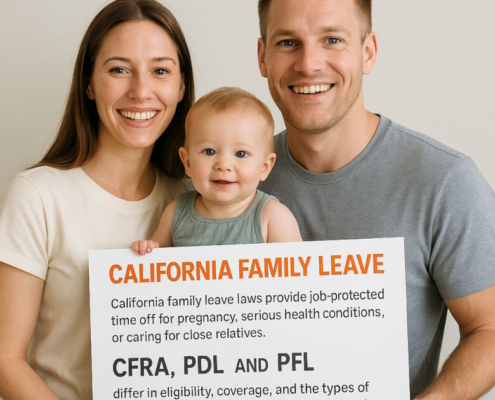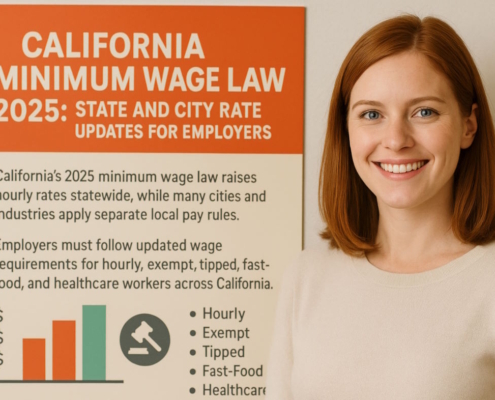Want a lawyer to help make money rain on you because your employer is not paying correctly? Read on! As an employment attorney, one of the most frequent question employees ask is, “Can i sue my employer for not paying me correctly?” In California, an employee can file an unpaid wage claim to recover wages that your employer has failed to pay.
This article discusses the following topics:
Can You Sue a Company for Not Paying You?
Yes, you can sue a company for not paying you the wages you earned. Federal laws such as the Fair Labor Standards Act (FLSA) and state labor laws require employers to compensate employees according to agreed terms. If an employer fails to pay, employees can file a lawsuit to recover unpaid wages.
For example, Jane worked for a marketing firm and wasn’t paid for her final two projects. She asked herself, “Can you sue a company for not paying you?” and consulted an attorney. Jane successfully sued the company and received her unpaid wages, including interest and penalties for the delay.
According to federal and state labor laws, an employer must pay employees their earned wages within a set timeframe. In California, for instance, employees must receive their pay within the designated pay period. If an employer doesn’t comply, the law entitles employees to file a claim against the company.
If an employer fails to pay you as per the law, you can recover unpaid wages, interest, legal fees, and penalties. The court may also award additional damages if there was a deliberate attempt to withhold payments.
Can I Sue a Company for Not Paying Me?
Yes, you can sue a company for not paying you according to employment law. State and federal wage laws obligate employers to meet their payroll obligations on time. If they fail, employees have the right to sue for compensation.
For instance, Daniel worked as a freelance designer but wasn’t paid for several months of work. He wondered, “Can I sue a company for not paying me?” After seeking legal advice, Daniel sued the company and recovered his earnings, along with interest for the delayed payments.
The law, specifically the Fair Labor Standards Act (FLSA), provides that employees are entitled to timely payment for all hours worked. California state law, for example, mandates final paychecks to be given immediately upon termination in most cases.
If you successfully sue a company for not paying you, you may be entitled to recover unpaid wages, interest on those wages, attorney’s fees, and sometimes even punitive damages if the employer acted in bad faith.
Can You Sue a Job for Not Paying You?
Yes, you can sue a job for not paying you if your employer fails to meet their wage obligations. State and federal laws make it clear that all employees must be paid for their work within the agreed period. If your employer doesn’t pay you, filing a lawsuit is a legal option.
For example, Michelle worked at a retail job that continually delayed her paycheck. Frustrated, she questioned, “Can you sue a job for not paying you?” Michelle sought legal advice and successfully filed a claim, receiving her wages plus damages for the financial inconvenience.
Under wage laws like the FLSA and specific state statutes, employers must pay employees according to the agreed terms of employment. Failure to do so gives employees the right to file claims and pursue legal remedies.
If you sue a job for not paying you, you could be entitled to recover the unpaid wages, interest, and attorney fees. You may also be awarded damages if the employer’s conduct was willful or negligent.
Can You Sue Someone for Not Paying You for Work?
Yes, you can sue someone for not paying you for work, whether they are an individual or a company. Legally, employers and independent contractors must be compensated for services rendered according to their agreement. Failure to pay can result in a lawsuit.
For instance, Tom, a contractor, provided IT services to a small business owner who refused to pay. Tom asked himself, “Can you sue someone for not paying you for work?” He pursued legal action and won a judgment against the business owner for unpaid fees and interest.
According to contract and labor laws, individuals who provide services are entitled to compensation. Breach of this agreement may be pursued through legal claims in small claims court or civil court, depending on the amount owed.
If you successfully sue someone for not paying you, you may recover the payment owed, interest, and legal costs. Courts may also order punitive damages if the non-payment was intentional.
Can You Sue for Not Getting Paid?
Yes, you can sue for not getting paid if your employer fails to compensate you for your work. Labor laws enforce strict guidelines on wage payments, ensuring employees are paid within an agreed timeframe. If employers don’t comply, employees can file a lawsuit.
For example, Lisa worked for a catering company that didn’t pay her for several events she worked. She asked, “Can you sue for not getting paid?” After speaking to a lawyer, Lisa sued the company and recovered her earnings plus compensation for the inconvenience.
Labor laws like the FLSA establish clear requirements for paying employees for all hours worked. Non-payment or delayed payment is grounds for legal action.
When you sue for not getting paid, you may recover wages, interest, legal fees, and additional damages if the employer’s actions were malicious or in bad faith.
How to Sue a Company for Not Paying You
To sue a company for not paying you, start by documenting your hours and attempts to resolve the matter. Then, you can file a wage claim with the labor department or hire an attorney to file a lawsuit. Pursuing legal action can help you recover your unpaid wages.
For example, when Steve noticed discrepancies in his paychecks, he researched “how to sue a company for not paying you.” Steve kept records, filed a wage claim, and successfully sued the company for unpaid wages and damages for intentional non-payment.
Labor laws allow employees to pursue unpaid wages through wage claims or lawsuits. Employers must meet their legal obligations, and failure to pay employees can result in significant penalties.
If you successfully sue a company for not paying you, you may recover unpaid wages, interest, and legal fees. Courts may also impose additional penalties on employers who violate wage laws.
Employer Not Paying on Time
If your employer is not paying on time, you have legal grounds to file a complaint or a lawsuit. Wage laws require that employers meet payroll deadlines and adhere to agreed payment schedules. Failure to do so can result in legal consequences for the employer.
For instance, Brian faced issues with his employer not paying on time for multiple months. Tired of the delays, he decided to pursue a legal claim, proving that the employer was violating state labor laws by not paying on time.
State and federal laws such as California’s labor laws impose strict deadlines for wage payments. If an employer is not paying on time, employees have the right to file a claim for damages.
If your employer is not paying on time, you can recover late wages, interest, and legal fees. Additional damages may be awarded if the employer’s conduct was deliberate or caused financial harm.
Employer Didn’t Pay Me
If your employer didn’t pay you, you are entitled to take legal action. Wage laws protect employees from non-payment and allow them to file wage claims or lawsuits. Employers must pay employees all wages owed in a timely manner.
For example, Laura’s employer didn’t pay her final paycheck after she resigned. Frustrated, Laura sought legal counsel and filed a complaint, leading to a court-ordered payment of her final wages.
The law mandates that employers must pay all wages earned by employees, including final paychecks, within a specific period. Non-compliance opens up the employer to legal claims.
If an employer didn’t pay you, you may recover the unpaid wages, interest, and legal costs. Courts may also impose penalties if the employer’s actions were willful or harmful.
Can You Sue an Employer for Not Paying You?
Yes, you can sue an employer for not paying you. If an employer fails to pay you wages owed, federal and state laws such as the Fair Labor Standards Act (FLSA) allow you to file a lawsuit against the employer. These laws ensure that all employees receive their agreed-upon wages on time and in full.
For example, if Lisa was not paid for her overtime work, she could ask herself, “Can you sue an employer for not paying you?” In Lisa’s case, she sought legal advice and filed a lawsuit under the FLSA. She was able to recover her unpaid overtime wages, along with penalties and legal fees.
According to the FLSA, employers must pay for all hours worked, including overtime. In California, state laws impose stricter requirements on employers, making it illegal to withhold wages or delay payment. Failure to do so allows employees to file a wage claim or take legal action.
If you sue an employer for not paying you, you could recover unpaid wages, interest on those wages, and legal fees. In cases of deliberate non-payment, additional penalties may be imposed on the employer.
Can I Sue My Job for Not Paying Me?
Yes, you can sue your job for not paying you. If your job fails to fulfill their payroll obligations, you are entitled to file a lawsuit. Both federal and state laws protect employees’ rights to fair and timely wages. If internal attempts to resolve the issue are unsuccessful, legal action may be necessary.
For instance, Sarah was consistently underpaid by her retail job. She wondered, “Can I sue my job for not paying me?” After failed negotiations, Sarah filed a wage claim and sued her employer. The court awarded her back pay and additional damages for the inconvenience caused.
The FLSA and similar state laws in California require employers to pay employees all due wages within set periods. If your job fails to do this, you can take the matter to court to recover your rightful earnings.
If you sue your job for not paying you, you could recover back wages, interest, and legal fees. Courts may also award additional damages if your employer intentionally withheld your pay.
Can I Sue Employer for Not Paying Me?
Yes, you can sue an employer for not paying you as agreed. Wage and hour laws, such as the FLSA and California’s state laws, obligate employers to pay their employees according to the terms of employment. If your employer doesn’t meet these obligations, you have the right to take legal action.
For example, John was working on a project when his employer stopped paying him without notice. John asked, “Can I sue employer for not paying me?” He decided to consult an attorney, who helped him file a lawsuit. John was able to recover the amount he was owed, along with interest.
The FLSA mandates that employers must pay all earned wages, and in California, this requirement extends to regular wages, overtime, and other agreed payments. Non-compliance gives employees the right to file a lawsuit.
If you sue an employer for not paying you, you can recover unpaid wages, interest, and possibly punitive damages if the court finds the employer’s actions were willful.
Sue Employer for Unpaid Wages
You can sue an employer for unpaid wages if they fail to compensate you as required by law. Federal and state laws clearly define employers’ obligations to pay wages, including overtime, bonuses, and final paychecks. If these obligations are not met, legal action is a viable option.
For instance, David worked as a server but wasn’t paid his due overtime wages. He decided to sue his employer for unpaid wages, citing California state law. David’s lawsuit resulted in a favorable ruling, awarding him back wages and damages for the delayed payment.
Under the FLSA and California labor laws, employees have the right to receive all earned wages on time. Employers who fail to meet these requirements may be taken to court to address wage disputes.
When you sue an employer for unpaid wages, you can recover the unpaid amount, legal fees, and possibly punitive damages. The court may impose penalties on the employer if the non-payment was intentional.
What Happens If an Employer Doesn’t Pay You?
If an employer doesn’t pay you, you have legal options to recover your wages. Employees can file a wage claim with the labor department or pursue a lawsuit against their employer. Both federal and state laws protect employees’ rights to timely payment.
For example, Kelly’s employer didn’t pay her for her final two weeks of work. Unsure of what happens if an employer doesn’t pay you, she filed a complaint with the state labor board. The investigation resulted in Kelly receiving her final pay along with penalties against her employer.
According to the FLSA and California wage laws, employers must pay employees their earned wages within a set period. Non-compliance opens up employers to wage claims and lawsuits, with additional penalties for delays.
If your employer doesn’t pay you, you can recover the unpaid wages, interest, and legal costs. In some cases, the court may also impose fines on the employer for violating wage laws.
Can I Sue My Employer for Not Paying Me Correctly?
Yes, you can sue your employer for not paying you correctly if your paycheck doesn’t reflect the full amount owed. Wage laws require employers to pay the correct amount based on hours worked, including overtime and agreed rates. If there are discrepancies, you can take legal action to recover the shortfall.
For instance, Laura realized her employer wasn’t paying her correctly for her overtime hours. She asked herself, “Can I sue my employer for not paying me correctly?” After failed attempts to resolve it internally, Laura filed a lawsuit and was awarded her missing overtime pay and additional damages.
The FLSA and state laws in California mandate that employees must be paid correctly for all hours worked. If there are discrepancies, employees can pursue legal remedies to recover the difference.
When you sue your employer for not paying you correctly, you may recover the shortfall, interest, and legal fees. In cases of intentional underpayment, courts may also impose penalties on the employer.
Can You Sue Your Boss for Not Paying You?
Yes, you can sue your boss for not paying you if they fail to meet wage obligations. Laws such as the FLSA and California’s labor code protect employees’ rights to fair compensation. If internal efforts to resolve the issue fail, taking legal action against your boss is a legitimate option.
For example, Mike’s boss at his restaurant job consistently delayed his payments. Frustrated, Mike asked, “Can you sue your boss for not paying you?” He consulted an attorney, who helped him file a lawsuit, resulting in compensation for his delayed wages and interest.
Federal and state labor laws hold all employers, including small business owners, accountable for paying employees on time and in full. Failure to do so can result in wage claims and lawsuits.
If you sue your boss for not paying you, you could recover delayed wages, legal fees, and possibly damages if the delay was intentional. Courts may also penalize employers who disregard wage laws.
Can You Sue Your Job for Not Paying You?
Yes, you can sue your job for not paying you if they fail to pay wages owed. State and federal laws ensure that employees receive their agreed compensation on time. If these obligations are not met, legal action against your employer is warranted.
For example, Jessica worked as a part-time employee but wasn’t paid for her final shift. She questioned, “Can you sue your job for not paying you?” After consulting a lawyer, Jessica sued her employer and received her due wages along with additional damages.
The FLSA and state laws in California mandate that all jobs must pay employees their earned wages promptly. Failure to comply allows employees to file claims and seek legal recourse.
If you sue your job for not paying you, you can recover the unpaid wages, interest, and legal fees. In cases of deliberate non-payment, courts may also award punitive damages.
Can You Sue a Company for Not Paying You on Time?
Yes, you can sue a company for not paying you on time if it consistently fails to meet its payroll obligations. Federal law, specifically the Fair Labor Standards Act (FLSA), and state laws require employers to pay employees according to a set schedule. If a company doesn’t pay on time, it can be held liable for damages and penalties.
For example, if Sarah’s employer consistently delays her paycheck beyond the agreed-upon payday, Sarah could wonder, “Can you sue a company for not paying you on time?” After documenting the delayed payments, Sarah filed a wage claim and was able to recover her late wages along with additional damages.
The law mandates that employers must pay employees in a timely manner, as agreed upon in the employment contract. Repeated delays in payments can lead to legal action and penalties against the company.
If you sue a company for not paying you on time, you can recover the late wages, interest, and potentially additional penalties. Courts may also order the company to cover legal fees if the delayed payments caused significant hardship.
Employer Not Paying on Time California
In California, state law protects employees from employers not paying on time. California labor laws are strict in mandating timely payment of wages, including overtime, bonuses, and final paychecks. If an employer fails to comply with these laws, employees can file a claim with the California Labor Commissioner.
For instance, David worked as a graphic designer and faced repeated delays in receiving his wages. Concerned about his rights, he researched “employer not paying on time California” and filed a complaint with the state’s labor department. The investigation resulted in his employer being penalized, and David received his wages plus interest.
According to California Labor Code sections 201-204, employers are required to pay employees within specific periods. Any delays can lead to penalties, such as daily fines for each late payment.
If an employer is not paying on time in California, employees can recover their delayed wages, interest, and penalties. Employers may also face additional fines for violating the state’s labor laws.
Can I Sue My Employer for Not Paying Me on Time?
Yes, you can sue your employer for not paying you on time if they consistently fail to meet payroll deadlines. The FLSA and state laws like California’s wage laws require employers to follow regular pay schedules. Failure to do so can result in wage claims and lawsuits.
For example, Jennifer’s employer repeatedly delayed her bi-weekly paychecks, making it difficult for her to cover her expenses. Frustrated, she asked, “Can I sue my employer for not paying me on time?” Jennifer filed a lawsuit and recovered her unpaid wages along with penalties for her employer’s ongoing delays.
The law mandates that employers must adhere to the agreed-upon pay schedule. If employers fail to do so, employees have the right to take legal action to recover their lost or delayed wages.
If you sue your employer for not paying you on time, you may recover the delayed wages, interest, and potentially additional damages. Courts may also award attorney fees and impose fines on employers who repeatedly fail to pay on time.
Can I Sue a Job for Not Paying Me?
Yes, you can sue a job for not paying you if it fails to compensate you on time or in full. Employers are legally obligated to pay employees as per the agreed schedule and rate. If they fail to do so, you can pursue legal action to recover your wages.
For instance, Tony worked part-time for a catering company, and his employer often delayed his payments. Unsure of his options, Tony asked, “Can I sue a job for not paying me?” After documenting the delayed payments, Tony filed a complaint and was able to recover his wages plus damages for the inconvenience.
The FLSA and state laws require all jobs to pay employees promptly and fully. If employers fail to meet these requirements, employees can file wage claims or take legal action.
When you sue a job for not paying you, you may recover unpaid wages, interest, and legal fees. Additional damages may be awarded if the employer’s conduct was deliberate or caused financial harm.
What If My Employer Doesn’t Pay Me on Time?
If your employer doesn’t pay you on time, you should take steps to protect your rights. Document all instances of delayed payment and communicate with your employer to seek resolution. If that fails, you can file a wage claim with your state’s labor department or pursue legal action.
For example, Emily’s employer failed to pay her on the designated payday for three consecutive months. Unsure of her rights, Emily asked herself, “What if my employer doesn’t pay me on time?” Emily filed a formal complaint with the state’s labor board, which led to her receiving her overdue wages and penalties against her employer.
The law requires employers to pay employees on their scheduled payday. Failure to do so can result in legal consequences and wage claims filed by affected employees.
If your employer doesn’t pay you on time, you can recover the unpaid wages, interest, and potentially legal fees. Courts may also impose penalties on employers who consistently fail to meet payroll deadlines.
Can I Sue for Not Getting Paid?
Yes, you can sue for not getting paid if your employer fails to provide you with your rightful wages. Federal and state laws ensure that employees receive compensation for all hours worked. If an employer doesn’t pay, employees can file a lawsuit to recover their earnings.
For example, Mark worked several hours of overtime, but his employer didn’t include the extra hours in his paycheck. Frustrated, he asked, “Can I sue for not getting paid?” Mark sought legal advice, filed a lawsuit, and successfully recovered his unpaid wages and additional damages for the inconvenience caused.
The FLSA and similar state laws require employers to compensate employees for all hours worked, including overtime. Non-payment is grounds for legal action against the employer.
If you sue for not getting paid, you may recover your unpaid wages, interest, and legal fees. Courts may also impose additional penalties if the employer’s failure to pay was deliberate or repeated.































